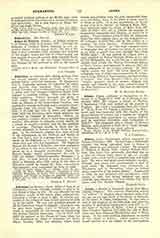www.catholic.com/encyclopedia/james-adams


Click to enlarge
Adams, James, professor of humanities at St. Omers, b. in England in 1737; d. at Dublin, December 6, 1802. He became a Jesuit at Watten, September 7, 1756, and worked on the mission in England. He wrote a translation from the French of “Early Rules for Taking a Likeness”, by Bonomaci; and was honored with the thanks of the Royal Society of London, for a treatise on “English Pronunciation, with appendices on various dialects, and an analytical discussion and vindication of Scotch”. He composed also a volume of Roman History, and projected a book on a “Tour through the Hebrides”, which was never printed.
T. J. CAMPBELL
Enjoying this content? Please support our mission!Donatewww.catholic.com/support-us

